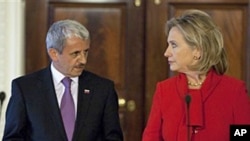U.S. Secretary of State Hillary Clinton and Slovak Foreign Minister Mikulas Dzurinda on Tuesday endorsed plans for a European Union-sponsored dialogue between Serbia and Kosovo. But the Slovak minister said his government does not plan to recognize the independence of the former Serbian province.
The Slovak foreign minister said his government will not follow the lead of the United States and most European Union member states in recognizing Kosovar independence.
But the meeting here was amiable, with Clinton and Dzurinda expressing hope that pending talks between the Belgrade and Pristina governments can ease tensions.
Clinton made a three-day trip to the Balkans last week that included stops in Serbia and its majority-Albanian former province, which declared independence in 2008 after nearly a decade as a U.N. protectorate.
While in Pristina, the secretary of state pledged to try to expand the list of some 70 countries that recognize Kosovo.
At a joint press event with Clinton, the Slovak foreign minister said the issue came up at their meeting but that he did not feel pressured. Dzurinda said that despite their difference on Kosovo recognition, he agrees with Clinton on the importance of Belgrade-Pristina dialogue.
"The goal is to help or to facilitate, to establish relations between Belgrade and Pristina, which will be good, smooth, substantial and sustainable," said Mikulas Dzurinda. "This is the goal. And I believe that Slovakia, as a country not recognizing Kosovo, can help a lot. I want that. I will do my best."
Dzurinda praised Clinton for visiting the minority-Serb enclave of Gracanica near Pristina, and for stating that the success of Kosovo depends in large part on how well it treats its ethnic-Serbs.
The secretary of state reiterated the U.S. view that the status of Kosovo was settled by the International Court of Justice ruling in July that upheld the legality of its independence declaration.
But Clinton said she and Dzurinda agree "totally" on the need to integrate the western Balkans with the European Union and Euro-Atlantic institutions.
"I think we both have the same goals," said Hillary Clinton. "Obviously, we would like to see more countries recognize Kosovo now that the International Court of Justice decision has been determined. But we also know it's important to keep working to bridge the historical divisions, so that we can have a region that is peaceful and stable and moving toward Europe."
Dzurinda said he briefed Clinton on efforts by his government as the current chair of the Visegrad Group - Poland, Hungary, the Czech Republic and Slovakia - to advance regional energy security and inclusion for the Roma minority.
He also said that next month Slovakia will announce an increase in its 300-member NATO troop contingent in Afghanistan.
US, Slovakia Urge Serbia-Kosovo Dialogue




